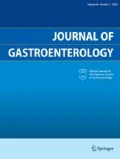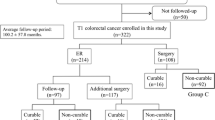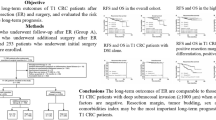Abstract
Background
We aimed to clarify the long-term outcomes of patients with T1 colorectal carcinoma (CRC) after endoscopic resection (ER) and surgical resection.
Methods
We examined T1 CRC patients treated during 1992–2008 and who had ≥5 years of follow-up. Patients who did not meet the curative criteria after ER according to the Japanese Society for Cancer of the Colon and Rectum (JSCCR) guidelines were defined as “non-endoscopically curable” and classified into three groups: ER alone (Group A: 121 patients), additional surgery after ER (Group B: 238 patients), and surgical resection alone (Group C: 342 patients). Long-term outcomes and predictors of recurrence were analyzed.
Results
Of the 882 patients with T1 CRC, 701 were non-endoscopically curable. Among these patients, recurrence and 5-year overall survival (OS) rates were 0.6 and 91.1%, respectively. In Groups A, B, and C, recurrence rates were 5.0, 5.5, and 3.8%, OS rates were 79.3, 92.4, and 91.5% (p < 0.01), and 5-year disease-free survival (DFS) rates were 98.1, 97.9, and 98.5%, respectively. Thirty-two patients experienced local recurrence or distant/lymph node metastasis (Group A: 6; Group B: 13; Group C: 13) and 14 patients died of primary CRC (Group A: 3; Group B: 7; Group C: 4). Age ≥65 years, protruded gross type, positive lymphatic invasion, and high budding grade were significant predictors of recurrence in non-endoscopically curable patients.
Conclusions
Our findings supported the JSCCR criteria for endoscopically curable T1 CRC. ER for T1 CRC did not worsen the clinical outcomes of patients who required additional surgical resection.



Similar content being viewed by others
References
Ferlay J, Parkin DM, Steliarova-Foucher E. Estimates of cancer incidence and mortality in Europe in 2008. Eur J Cancer. 2010;46:765–81.
Matsuda T, Marugame T, Kamo K, et al. Cancer incidence and incidence rates in Japan in 2006: based on data from 15 population-based cancer registries in the monitoring of cancer incidence in Japan (MCIJ) project. Jpn J Clin Oncol. 2012;42:139–47.
Morson BC, Whiteway JE, Jones EA, et al. Histopathology and prognosis of malignant colorectal polyps treated by endoscopic polypectomy. Gut. 1984;25:437–44.
Asayama N, Oka S, Tanaka S, et al. Endoscopic submucosal dissection as total excisional biopsy for clinical T1 colorectal carcinoma. Digestion. 2015;91:64–9.
Ozawa S, Tanaka S, Hayashi N, et al. Risk factors for vertical incomplete resection in endoscopic submucosal dissection as total excisional biopsy for submucosal invasive colorectal carcinoma. Int J Colorectal Dis. 2013;28:1247–56.
Oka S, Tanaka S, Saito Y, et al. Local recurrence after endoscopic resection for large colorectal neoplasia: a multicenter prospective study in Japan. Am J Gastroenterol. 2015;110:697–707.
Saitoh Y, Inaba Y, Sasaki T, et al. Management of colorectal T1 carcinoma treated by endoscopic resection. Dig Endosc. 2016;28:324–9.
Watanabe T, Itabashi M, Shimada Y, et al. Japanese Society for Cancer of the Colon and Rectum (JSCCR) guidelines 2014 for the treatment of colorectal cancer. Int J Clin Oncol. 2015;20:207–39.
Kitajima K, Fujimori T, Fujii S, et al. Correlations between lymph node metastasis and depth of submucosal invasion in submucosal invasive colorectal carcinoma: a Japanese collaborative study. J Gastroenterol. 2004;39:534–43.
Nascimbeni R, Burgart LJ, Nivatvongs S, et al. Risk of lymph node metastasis in T1 carcinoma of the colon and rectum. Dis Colon Rectum. 2002;45:200–6.
Hassan C, Zullo A, Risio M, et al. Histologic risk factors and clinical outcome in colorectal malignant polyp: a pooled-data analysis. Dis Colon Rectum. 2005;48:1588–96.
Yasuda K, Inomata M, Shiromizu A, et al. Risk factors for occult lymph node metastasis of colorectal cancer invading the submucosa and indications for endoscopic mucosal resection. Dis Colon Rectum. 2007;50:1370–6.
Nakadoi K, Tanaka S, Kanao H, et al. Management of T1 colorectal carcinoma with special reference to criteria for curative endoscopic resection. J Gastroenterol Hepatol. 2012;27:1057–62.
Tanaka S, Haruma K, Teixeira CR, et al. Endoscopic treatment of submucosal invasive colorectal carcinoma with special reference to risk factors for lymph node metastasis. J Gastroenterol. 1995;30:710–7.
Kobayashi H, Mochizuki H, Morita T, et al. Characteristics of recurrence after curative resection for T1 colorectal cancer: Japanese multicenter study. J Gastroenterol. 2011;46:203–11.
Ueno H, Mochizuki H, Hashiguchi Y, et al. Risk factors for an adverse outcome in early invasive colorectal carcinoma. Gastroenterology. 2004;127:385–94.
Suh JH, Han KS, Kim BC, et al. Predictors for lymph node metastasis in T1 colorectal cancer. Endoscopy. 2012;44:590–5.
Yoshii S, Nojima M, Nosho K, et al. Factors associated with risk for colorectal cancer recurrence after endoscopic resection of T1 tumors. Clin Gastroenterol Hepatol. 2014;2:292–302.
Oka S, Tanaka S, Kanao H, et al. Mid-term prognosis after endoscopic resection for submucosal colorectal carcinoma: summary of a multicenter questionnaire survey conducted by the colorectal endoscopic resection standardization implementation working group in Japanese Society for Cancer of the Colon and Rectum. Dig Endosc. 2011;23:190–4.
Nakadoi K, Oka S, Tanaka S, et al. Condition of muscularis mucosae is a risk factor for lymph node metastasis in T1 colorectal carcinoma. Surg Endosc. 2014;28:1269–76.
Miyachi H, Kudo SE, Ichimasa K, et al. Management of T1 colorectal cancers after endoscopic treatment based on the risk stratification of lymph node metastasis. J Gastroenterol Hepatol. 2016;31:1126–32.
Ikematsu H, Yoda Y, Matsuda T, et al. Long-term outcomes after resection for submucosal invasive colorectal cancers. Gastroenterology. 2013;144:551–9.
Asayama N, Oka S, Tanaka S, et al. Long-term outcomes after treatment for T1 colorectal carcinoma. Int J Colorectal Dis. 2016;31:571–8.
Yoda Y, Ikematsu H, Matsuda T, et al. A large-scale multicenter study of long-term outcomes after endoscopic resection for submucosal invasive colorectal cancer. Endoscopy. 2013;45:718–24.
Belderbos TD, van Erning FN, de Hingh IH, et al. Long-term recurrence-free survival after standard endoscopic resection versus surgical resection of submucosal invasive colorectal cancer: a population-based study. Clin Gastroenterol Hepatol. 2016;. doi:10.1016/j.cgh.2016.08.041.
Japanese Society for Cancer of the Colon and Rectum. General rules for clinical and pathological studies on cancer of the colon, rectum and anus. Revision 4th ed. Tokyo: Kanehara & Co., Ltd.; 1986.
Japanese Society for Cancer of the Colon and Rectum. General rules for clinical and pathological studies on cancer of the colon, rectum and anus. Revision 5th ed. Tokyo: Kanehara & Co., Ltd.; 1994.
Japanese Society for Cancer of the Colon and Rectum. General rules for clinical and pathological studies on cancer of the colon, rectum and anus. 1998 6th ed. Tokyo: Kanehara & Co., Ltd.; 1998.
Japanese Society for Cancer of the Colon and Rectum. JSCCR guidelines 2005 for the treatment of colorectal cancer. Tokyo: Kanehara & Co., Ltd; 2005.
Whitlow C, Gathright JB Jr, Hebert SJ, et al. Long-term survival after treatment of malignant colonic polyps. Dis Colon Rectum. 1997;40:929–34.
Read TE, Mutch MG, Chang BW, et al. Locoregional recurrence and survival after curative resection of adenocarcinoma of the colon. J Am Coll Surg. 2002;195:33–40.
Barillari P, Ramacciato G, Manetti G, et al. Surveillance of colorectal cancer: effectiveness of early detection of intraluminal recurrences on prognosis and survival of patients treated for cure. Dis Colon Rectum. 1996;39:388–93.
Choi DH, Sohn DK, Chang HJ, et al. Indications for subsequent surgery after endoscopic resection of submucosally invasive colorectal carcinomas: a prospective cohort study. Dis Colon Rectum. 2009;52:438–45.
Rickert A, Aliyev R, Belle S, et al. Oncologic colorectal resection after endoscopic treatment of malignant polyps: does endoscopy have an adverse effect on oncologic and surgical outcomes? Gastrointest Endosc. 2014;79:951–60.
Overwater A, Kessels K, Elias SG, et al. Endoscopic resection of high-risk T1 colorectal carcinoma prior to surgical resection has no adverse effect on long-term outcomes. Gut. 2016;. doi:10.1136/gutjnl-2015-310961.
Fleischer D, Goldberg S, Browning T, et al. Detection and surveillance of colorectal cancer. JAMA. 1989;261:580–5.
Kaneko I, Tanaka S, Oka S, et al. Immunohistochemical molecular markers as predictors of curability of endoscopically resected submucosal colorectal cancer. World J Gastroenterol. 2007;13:3829–35.
Acknowledgements
This study was conducted with a Grant-in-Aid from the Japan Agency for Medical Research and Development, AMED (15ck0106102h0102).
Author information
Authors and Affiliations
Corresponding author
Ethics declarations
Conflict of interest
The authors declare that they have no conflict of interest
Rights and permissions
About this article
Cite this article
Tamaru, Y., Oka, S., Tanaka, S. et al. Long-term outcomes after treatment for T1 colorectal carcinoma: a multicenter retrospective cohort study of Hiroshima GI Endoscopy Research Group. J Gastroenterol 52, 1169–1179 (2017). https://doi.org/10.1007/s00535-017-1318-1
Received:
Accepted:
Published:
Issue Date:
DOI: https://doi.org/10.1007/s00535-017-1318-1




